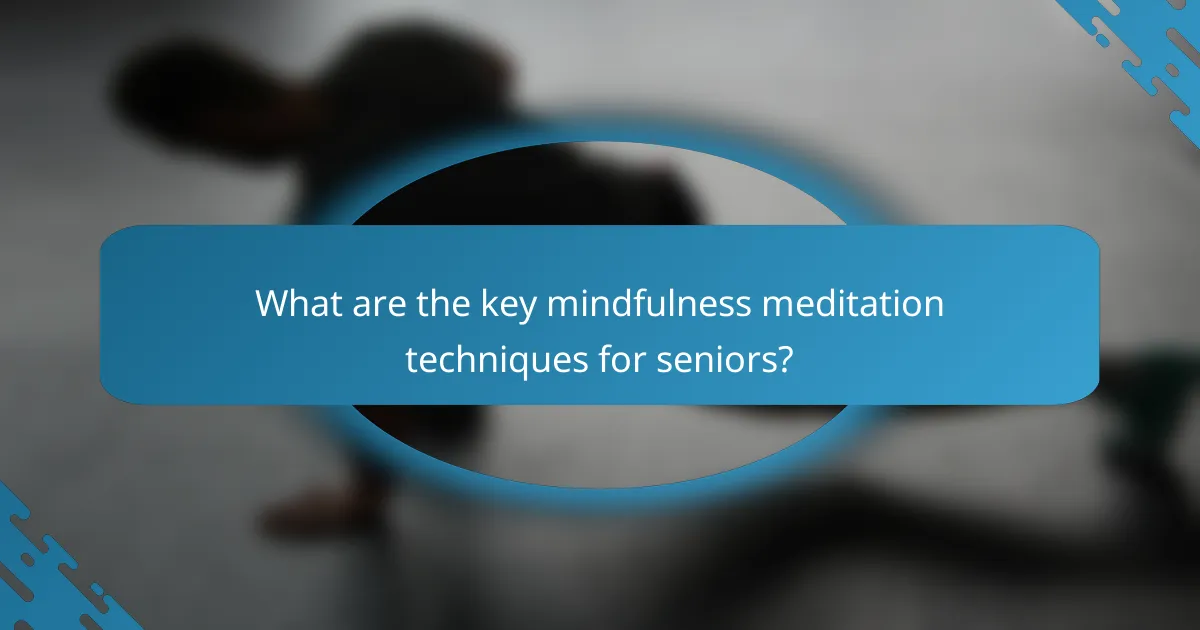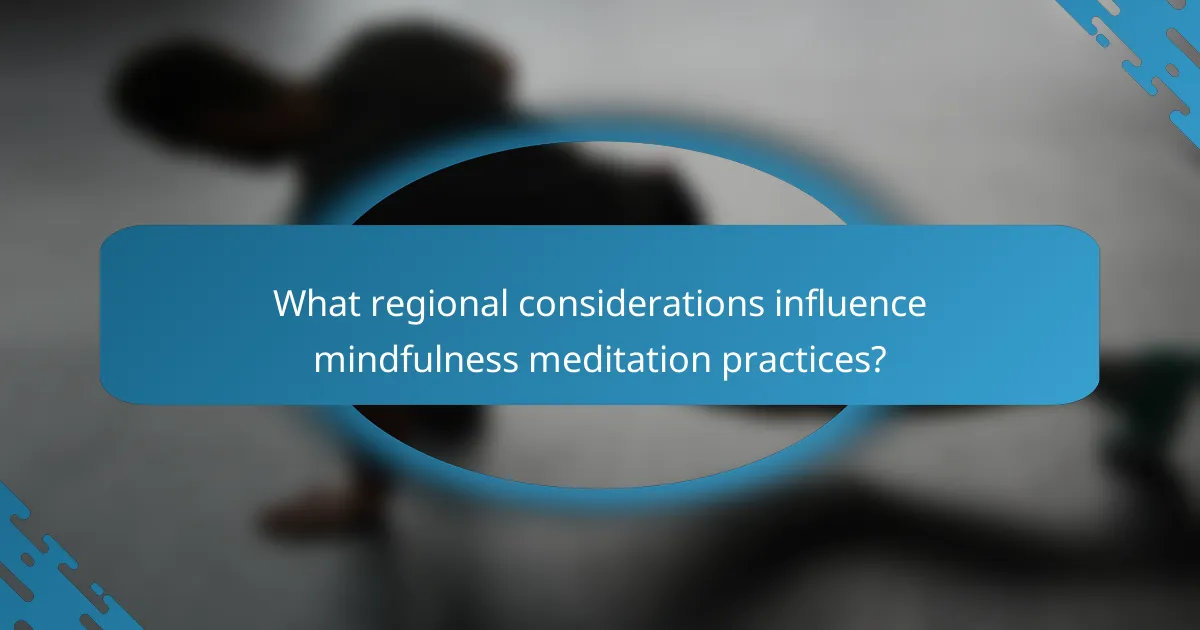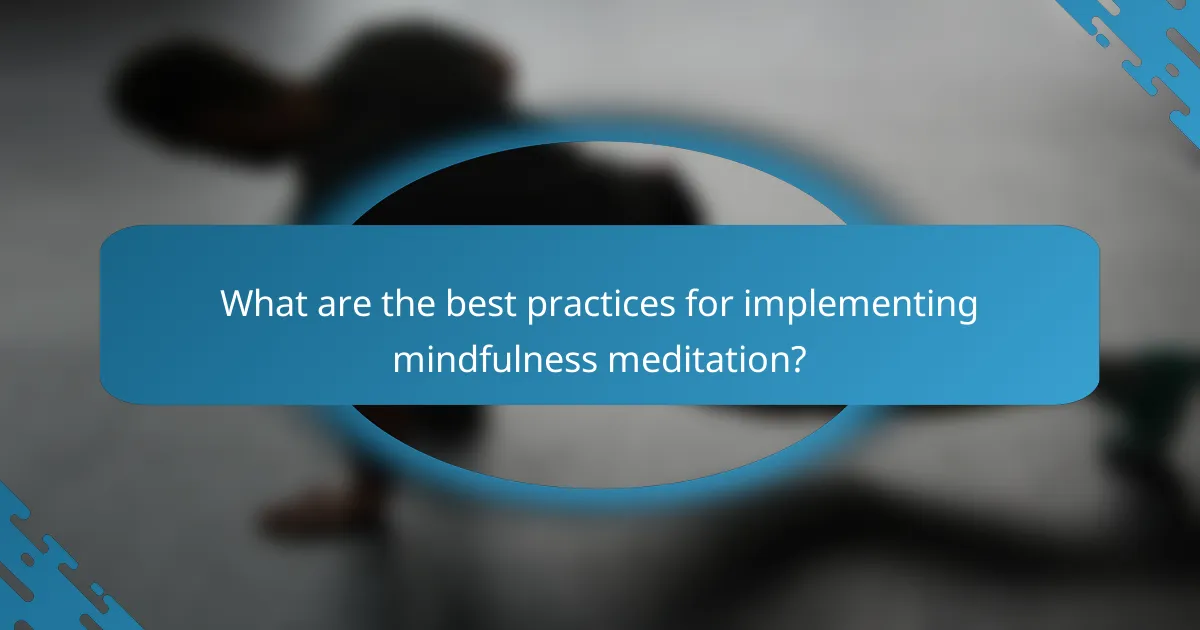Mindfulness meditation techniques can significantly enhance emotional well-being in seniors by reducing stress and promoting relaxation. Key practices include breathing exercises, body scans, and guided imagery. These techniques are accessible and suitable for short sessions, fostering improved mood and mental health. Regional considerations influence how these practices are adopted, highlighting the importance of simplicity, consistency, and community support for effective implementation.

What are the key mindfulness meditation techniques for seniors?
Mindfulness meditation techniques for seniors include breathing exercises, body scans, and guided imagery. These practices enhance emotional well-being by reducing stress and promoting relaxation.
Breathing exercises focus on deep, slow inhalations and exhalations, helping to centre the mind. Body scans involve paying attention to different body parts, fostering awareness and relaxation. Guided imagery uses visualisation to create calming mental images, aiding in emotional regulation.
These techniques are accessible and can be practised in short sessions, making them suitable for seniors. Regular practice can lead to improved mood and overall mental health.
How does mindfulness meditation impact emotional well-being?
Mindfulness meditation significantly enhances emotional well-being in seniors by reducing anxiety and depression. This practice encourages present-moment awareness, fostering a sense of calm and emotional resilience. Research indicates that regular engagement in mindfulness techniques can lead to improved mood and greater life satisfaction. Additionally, mindfulness enhances self-compassion, allowing seniors to navigate emotional challenges with greater ease.
What are the universal benefits of mindfulness meditation for seniors?
Mindfulness meditation offers several universal benefits for seniors, enhancing their emotional well-being. It reduces anxiety and stress, promoting a sense of calm and stability. Regular practice improves focus and cognitive function, helping seniors maintain mental sharpness. Additionally, mindfulness fosters emotional resilience, allowing seniors to better cope with life’s challenges. Social connections can also strengthen through group meditation practices, enhancing feelings of community and support.
How does mindfulness meditation reduce anxiety and depression?
Mindfulness meditation effectively reduces anxiety and depression by promoting emotional regulation and increasing self-awareness. This practice enhances focus on the present moment, which helps individuals detach from negative thoughts. Research indicates that seniors practising mindfulness experience lower levels of anxiety and improved mood stability. Regular sessions can lead to significant reductions in stress hormones, contributing to overall emotional well-being.
What role does mindfulness play in enhancing emotional resilience?
Mindfulness enhances emotional resilience by promoting awareness and acceptance of emotions. This practice helps seniors manage stress and anxiety, leading to improved emotional stability. Techniques such as focused breathing and body scans foster a deeper connection to the present moment, reducing rumination and enhancing coping strategies. Studies indicate that regular mindfulness practice can significantly lower the risk of depression and anxiety in older adults, showcasing its role in emotional well-being.
What unique attributes do mindfulness meditation techniques offer to seniors?
Mindfulness meditation techniques offer seniors unique attributes like improved emotional regulation, heightened self-awareness, and enhanced cognitive function. These benefits contribute to greater resilience against stress and anxiety. Additionally, techniques such as guided imagery and body scans can cater specifically to the physical limitations often experienced by seniors, making meditation more accessible. This tailored approach fosters a deeper connection to the present moment, promoting overall emotional well-being.
How can tailored meditation practices address age-related challenges?
Tailored meditation practices can effectively address age-related challenges by enhancing emotional well-being in seniors. These techniques promote relaxation, reduce anxiety, and improve cognitive function. For example, guided imagery can help seniors manage stress and foster positive emotions. Mindfulness meditation encourages present-moment awareness, which can combat feelings of loneliness and depression. Additionally, specific breathing exercises can enhance lung capacity and overall health, contributing to a more fulfilling life. By adapting meditation practices to individual needs, seniors can experience significant improvements in their emotional and mental health.
What specific techniques foster social connection among seniors?
Mindfulness meditation techniques foster social connection among seniors by promoting emotional awareness and empathy. Techniques like group meditation, loving-kindness meditation, and mindful listening enhance interpersonal relationships. These practices encourage shared experiences, reduce feelings of isolation, and improve communication skills, creating a supportive community environment.
What rare attributes of mindfulness meditation can enhance emotional well-being?
Mindfulness meditation can enhance emotional well-being in seniors through rare attributes like increased neuroplasticity, which fosters resilience, and enhanced emotional regulation, allowing for better responses to stress. These unique traits promote a deeper connection to the present moment, reducing anxiety and improving overall mood. Additionally, some seniors may experience heightened self-awareness, leading to more meaningful relationships and improved social interactions.
What innovative approaches are emerging in mindfulness for seniors?
Innovative approaches in mindfulness for seniors include virtual reality meditation, nature immersion practices, and community-based mindfulness programs. Virtual reality offers immersive experiences that enhance emotional well-being, while nature immersion connects seniors to calming environments. Community programs foster social interaction, which is crucial for mental health. These methods leverage technology and social engagement to improve mindfulness practices among older adults.
How can technology enhance mindfulness meditation experiences?
Technology can significantly enhance mindfulness meditation experiences by providing tools that facilitate practice and engagement. Mobile apps offer guided sessions tailored to seniors, incorporating calming sounds and reminders to promote consistency. Virtual reality can create immersive environments, helping users focus and relax. Wearable devices monitor physiological responses, allowing users to adjust their practice for optimal emotional well-being. Additionally, online communities foster social connections, encouraging shared experiences and support among seniors. These technological innovations cater to unique attributes of mindfulness meditation, enhancing accessibility and effectiveness for emotional well-being.

What regional considerations influence mindfulness meditation practices?
Regional considerations significantly influence mindfulness meditation practices among seniors. Cultural beliefs, available resources, and community support shape how these techniques are adopted. For example, in Eastern cultures, mindfulness often integrates with traditional practices, enhancing emotional well-being through familiar frameworks. Conversely, Western approaches may emphasize therapeutic benefits, focusing on stress reduction and mental health. Accessibility to trained instructors and community programs varies by region, impacting participation levels. Additionally, language and communication styles can affect how mindfulness concepts are conveyed and understood, tailoring practices to resonate with local populations.
How do cultural perceptions affect mindfulness meditation in different regions?
Cultural perceptions significantly influence mindfulness meditation practices across regions. In some cultures, mindfulness is deeply intertwined with spiritual traditions, enhancing emotional well-being through community engagement. In contrast, other regions may approach mindfulness as a secular tool for stress reduction, focusing on individual benefits. These variations shape techniques and the integration of mindfulness into daily life, affecting seniors’ emotional health. For instance, in Eastern cultures, collective meditation practices foster social bonds, while Western approaches often emphasize personal achievement and self-awareness. This cultural context leads to unique adaptations of mindfulness techniques, ultimately enhancing their effectiveness for seniors.
What common barriers do seniors face in adopting mindfulness meditation?
Seniors face several common barriers in adopting mindfulness meditation, including physical limitations, cognitive challenges, and lack of access to resources. Physical discomfort can hinder prolonged sitting, while cognitive decline may affect focus and retention of techniques. Additionally, limited access to classes or guided sessions can impede practice. Social isolation can further decrease motivation, making it difficult to engage in group settings or find supportive communities.
How can community programs support mindfulness meditation for seniors?
Community programs can greatly enhance mindfulness meditation for seniors by providing structured environments and social support. These programs often offer guided sessions that cater to seniors’ unique needs, promoting emotional well-being and reducing isolation.
Research indicates that participation in community-led mindfulness activities can lead to improved mental health outcomes, such as reduced anxiety and depression. Additionally, these programs can foster a sense of belonging, which is crucial for emotional resilience in older adults.
Unique attributes of successful community programs include trained facilitators who understand the specific challenges faced by seniors and adaptable formats that allow for varying levels of mobility and cognitive function. As a result, seniors can engage in practices that enhance their emotional well-being effectively.
Overall, community programs serve as vital resources for seniors, making mindfulness meditation accessible and beneficial.

What are the best practices for implementing mindfulness meditation?
To effectively implement mindfulness meditation, seniors should focus on simplicity, consistency, and a supportive environment. Start with short sessions, gradually increasing duration as comfort grows. Create a distraction-free space to enhance focus. Incorporate guided meditations using apps or videos tailored for seniors. Regular practice fosters emotional resilience and reduces anxiety. Encourage group sessions to build community support, enhancing motivation and commitment.
What tips can enhance the effectiveness of mindfulness meditation for seniors?
To enhance the effectiveness of mindfulness meditation for seniors, focus on structured practices, consistency, and supportive environments. Incorporate short sessions of 5-10 minutes to avoid overwhelming participants. Use guided meditations tailored for seniors to facilitate engagement. Encourage group sessions to foster social connections, enhancing emotional well-being. Lastly, emphasize the importance of a comfortable setting to promote relaxation and focus.
How can seniors create a conducive environment for meditation?
Seniors can create a conducive environment for meditation by ensuring a quiet, comfortable space free from distractions. Natural light and calming colours enhance relaxation. Incorporating comfortable seating, such as cushions or chairs, promotes physical comfort. Regularly scheduled meditation times help establish a routine, fostering consistency. Additionally, using soft music or nature sounds can create a soothing atmosphere, further enhancing emotional well-being.
What common mistakes should seniors avoid in mindfulness meditation?
Seniors should avoid common mistakes like rushing through meditation, expecting immediate results, and neglecting their physical comfort. Practising mindfulness requires patience and a comfortable environment. Setting realistic expectations enhances emotional well-being and fosters a more rewarding meditation experience.
How can seniors integrate mindfulness meditation into their daily routines?
Seniors can integrate mindfulness meditation into their daily routines by setting aside specific times, starting with short sessions, and using guided resources. Consistency is key; aim for a few minutes each day.
Establish a morning routine to set a calm tone for the day. Use apps or online videos for guided meditations tailored for seniors. Incorporate mindfulness during daily activities, such as eating or walking, to enhance emotional well-being.
Engaging in group sessions can provide social support and motivation. Consider joining local classes or online communities focused on mindfulness for seniors. These interactions can reinforce practice and create a sense of belonging.
Tracking progress through a journal can help seniors stay motivated and recognize the benefits over time. Noting improvements in mood or stress levels can encourage continued practice.
What strategies can help maintain consistency in practice?
To maintain consistency in mindfulness meditation practice, establish a routine that incorporates specific techniques. Setting a dedicated time each day, even for short sessions, can enhance emotional well-being. Using guided meditations can help seniors stay focused and engaged. Additionally, joining a community or group can provide support and motivation, reinforcing commitment to the practice. Tracking progress through journaling can also foster a sense of achievement and encourage ongoing practice.
How can family members support seniors in their mindfulness journey?
Family members can support seniors in their mindfulness journey by encouraging regular practice and providing a calm environment. They can participate in mindfulness activities, such as guided meditation or yoga, fostering a sense of community. Offering reminders and sharing resources enhances engagement. Additionally, discussing experiences can deepen understanding and motivation.